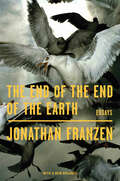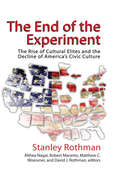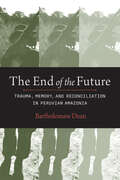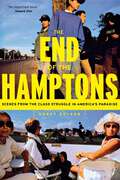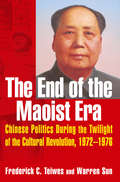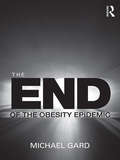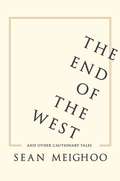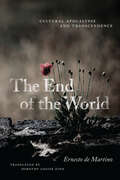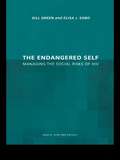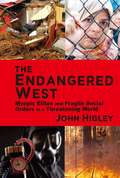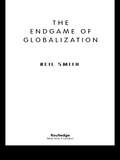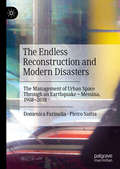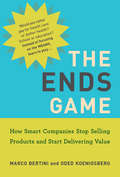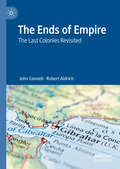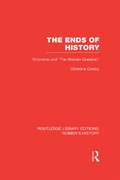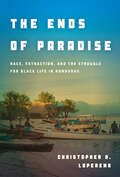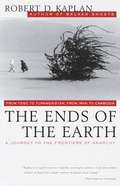- Table View
- List View
The End of the End of the Earth: Essays
by Jonathan FranzenFrom Jonathan Franzen, one of our preeminent writers and thinkers, comes a brilliant, searing essay collection that calls for us to take better care of our planet and one another in these troubled times.The End of the End of the Earth is a collection of Jonathan Franzen's essays and speeches from the past five years, in which he grapples with the most important and heated ethical subjects of the day: environmentalism, capitalism, wealth inequality, race, technology and the role of art. He challenges us to ask difficult questions: What is our civic responsibility in the face of climate change, the greatest ever threat to our planet and species? Does technology give us a sense of control or community or is it stripping these from us? Above all, in these essays, Franzen asks us to care--about causes great and small, with subjects as big as our planet and specific as a rare species of birds. These essays are in praise of empathy, and of the beauty and power of nature and art.This slim but powerful book is Franzen at his best, incisive, persuasive and compassionate.
The End of the End of the Earth: Essays
by Jonathan FranzenFrom Jonathan Franzen, one of our preeminent writers and thinkers, comes a brilliant, searing essay collection that calls for us to take better care of our planet and one another in these troubled times.The End of the End of the Earth is a collection of Jonathan Franzen's essays and speeches from the past five years, in which he grapples with the most important and heated ethical subjects of the day: environmentalism, capitalism, wealth inequality, race, technology and the role of art. He challenges us to ask difficult questions: What is our civic responsibility in the face of climate change, the greatest ever threat to our planet and species? Does technology give us a sense of control or community or is it stripping these from us? Above all, in these essays, Franzen asks us to care--about causes great and small, with subjects as big as our planet and specific as a rare species of birds. These essays are in praise of empathy, and of the beauty and power of nature and art.This slim but powerful book is Franzen at his best, incisive, persuasive and compassionate.
The End of the Experiment: The Rise of Cultural Elites and the Decline of America's Civic Culture
by Stanley RothmanThe End of the Experiment ties together Stanley Rothman's theory of post-industrialism and his four decades of research on American politics and society. Rothman discusses the rise and fall of the New Left, the sixties' impact on America's cultural elites, and the emergence of new post-industrial humanistic values.The first part of this book explains how cultural shifts in post-industrial society increased the influence of intellectuals and redefined America's core values. The second part examines how the shift in American social and cultural values led to a crisis of confidence in the American experiment. And in a final section, Rothman's contemporaries provide insight into his work, reflecting on his continued influence and his devotion to traditional liberalism.Rothman presents a quantitative study of personality differences between traditional American elites and new cultural elites. Rothman argues that the experiment of America—as a new nation rooted in democracy, morality, and civic virtue—is being destroyed by a disaffected intellectual class opposed to traditional values.
The End of the French Exception?
by Tony Chafer Emmanuel GodinThe End of the French Exception? seeks to understand how the French national polity has responded to external pressures such as Europeanization and globalization: what, if anything, makes French responses 'exceptional', or at least different, compared to those of other countries? How are we to understand these differences? And how might this analysis lead us to rethink or modify our hypothesis of French exceptionalism? The contributors to this collection analyse the ways in which the notion of the French exception has informed both academic analysis and political commentary on France today. Adopting a comparative and interdisciplinary approach it examines the resilience of the concept of French exceptionalism and evaluates its relevance in a changing domestic and global context. This highly topical volume also covers the Sarkozy presidency.
The End of the Future: Trauma, Memory, and Reconciliation in Peruvian Amazonia
by Bartholomew DeanIn The End of the Future, author Bartholomew Dean broadens the theoretical framework for understanding memory's role in reconciliation following a violent conflict. This book explores the complicated and confusing linkages between memory and trauma for individuals caught up in civil war and post-conflict reconciliation in the Peruvian Amazon's Huallaga Valley—an epicenter for leftist rebels and a booming shadow economy based on the extraction and circulation of cocaine. The End of the Future tells the story of violent attempts by the Túpac Amaru Revolutionary Movement (Movimiento Revolucionario Túpac Amaru, MRTA) to overthrow the state in the late 1980s and early 1990s from the perspective of the poorest residents of the lower Huallaga's Caynarachi Basin. To give context to the causes and consequences of the MRTA's presence in the lower and central Huallaga, this book relies on the written works and testimony of Sístero García Torres, an MRTA rebel commander; the government's Truth and Reconciliation Commission; MRTA propaganda; media accounts; and critical historical texts. Besides exposing Huallaga Valley human rights abuses, the book's contribution to political anthropology is consequential for its insistence that reconciliation is by no means equivalent to local, Indigenous notions of "justice" or customary forms of dispute resolution. Without deliberately addressing the diverse socio-cultural contours defining overlapping epistemologies of justice, freedom, and communal well-being, enduring reconciliation will likely remain elusive.
The End of the Hamptons: Scenes from the Class Struggle in America's Paradise
by Corey DolgonWinner of the 2005 Book Prize from the Association for Humanist SociologyA portrait of the contentious, controversial history of the Manhattan elite's favorite fabled summer playgroundIn this absorbing account of New York’s famous vacation playground, Corey Dolgon goes beyond the celebrity tales and polo games to tell us the story of this complex and contentious land. From the displacement of Native Americans by the Puritans to the first wave of Manhattan elites who built the Summer Colony, to the current infusion of telecommuting Manhattanites who now want to live there year-round, the story of the Hamptons is a vicious cycle of supposed paradise lost. Drawing on this fabled land's history, The End of the Hamptons provides a fascinating portrait of current controversies: the Native Americans fighting over land claims and threatening to build a casino, the environmental activists clashing with the McMansion builders, and the Latino day laborers and working-class natives trying to eke out a living in an ever-increasingly expensive town.
The End of the Maoist Era: Chinese Politics During the Twilight of the Cultural Revolution, 1972-1976 (The\politics Of Transition In China, 1972-1982 Ser.)
by Frederick C Teiwes Warren SunThis book launches an ambitious reexamination of the elite politics behind one of the most remarkable transformations in the late twentieth century. As the first part of a new interpretation of the evolution of Chinese politics during the years 1972-82, it provides a detailed study of the end of the Maoist era, demonstrating Mao's continuing dominance even as his ability to control events ebbed away. The tensions within the "gang of four," the different treatment of Zhou Enlai and Deng Xiaoping, and the largely unexamined role of younger radicals are analyzed to reveal a view of the dynamic of elite politics that is at odds with accepted scholarship. The authors draw upon newly available documentary sources and extensive interviews with Chinese participants and historians to develop their challenging interpretation of one of the most poorly understood periods in the history of the People's Republic of China.
The End of the Obesity Epidemic
by Michael GardDespite apocalyptic predictions from a vocal alliance of health professionals, politicians and social commentators that rising obesity levels would lead to a global health crisis, the crisis has not materialised. In this provocative follow up to his classic work of obesity scepticism, The Obesity Epidemic, Michael Gard argues that we have entered into a new, and perhaps terminal, phase of the obesity debate. Evidence suggests that obesity rates are levelling off in Western societies, life expectancies continue to rise in line with rising obesity rates, and across the world policy-makers have remained largely indifferent and inactive in the face of this apparently deadly threat to our health and well-being. Dissecting and dismissing much of the over-blown rhetoric and ideological bias found on both sides of the obesity debate, Gard demonstrates that the science of obesity remains radically uncertain and that it is impossible to establish an objective ‘truth’ on which to base policy. His powerful and inescapable conclusion is that we should now mark the end of the obesity epidemic. Offering a road map through the maze of claims and counter-claims, while still holding to a sceptical standpoint, this book provides an unparalleled anatomy of obesity as a scientific, political and cultural issue. It is essential reading for anybody with an interest in the science or sociology of health and lifestyle.
The End of the Peace Process: Oslo and After
by Edward W. SaidA collection of essays by literary and cultural critic, Edward W. Said. It provides a commentary on the peace process in the last six years of the 20th century, in which Said has been virtually a lone voice in the West supporting the rights of the Palestinian people. Now revised and updated by the author.
The End of the Soul: Scientific Modernity, Atheism, and Anthropology in France
by Jennifer HechtOn October 19, 1876 a group of leading French citizens, joined together to form the Society of Mutual Autopsy, with the aim of proving that souls do not exist. With this group as its focus, The End of the Soul is a study of science and atheism in France in late nineteenth and early twentieth centuries. It shows that anthropology grew out of a struggle between tradition (especially Catholicism) and modernism, and that it became for many a secular religion, with such adherents as Emile Zola, Margaret Sanger, and Arthur Conan Doyle.
The End of the Soul: Scientific Modernity, Atheism, and Anthropology in France
by Jennifer HechtOn October 19, 1876 a group of leading French citizens, both men and women included, joined together to form an unusual group, The Society of Mutual Autopsy, with the aim of proving that souls do not exist. The idea was that, after death, they would dissect one another and (hopefully) show a direct relationship between brain shapes and sizes and the character, abilities and intelligence of individuals. This strange scientific pact, and indeed what we have come to think of as anthropology, which the group's members helped to develop, had its genesis in aggressive, evangelical atheism.With this group as its focus, The End of the Soul is a study of science and atheism in France in late nineteenth and early twentieth centuries. It shows that anthropology grew in the context of an impassioned struggle between the forces of tradition, especially the Catholic faith, and those of a more freethinking modernism, and moreover that it became for many a secular religion. Among the adherents of this new faith discussed here are the novelist Emile Zola, the great statesman Leon Gambetta, the American birth control advocate Margaret Sanger, and Arthur Conan Doyle, whose Sherlock Holmes embodied the triumph of ratiocination over credulity.Boldly argued, full of colorful characters and often bizarre battles over science and faith, this book represents a major contribution to the history of science and European intellectual history.
The End of the West and Other Cautionary Tales
by Sean MeighooMost historical accounts of "the West" take it for granted that the guiding principles of the Western tradition—reason, progress, and freedom—have been passed down directly from ancient Greece to modern Europe, evolving in isolation from all non-Western cultures. Today, many political analysts and cultural critics maintain that the Western tradition is fast approaching its end, for better or worse, as it becomes more and more integrated with non-Western cultures in an increasingly globalized world. But what if we are witnessing something else entirely—not the "end" of the West but rather another historical mutation of the idea of the West itself?This groundbreaking work shows that whether the West is hailed as the source of all historical progress or scorned as the root of all cultural imperialism, it remains a deeply problematic concept that is intrinsically connected to an ethnocentric view of the world. In a critical reading of the continental philosophers Husserl, Heidegger, Levinas, and Derrida as well as the postcolonial thinkers Said, Mohanty, Bhabha, and Trinh, Sean Meighoo strikes at the intellectual foundations of Western exceptionalism until its ideological supports show through. Deconstructing the concept of the West in his provocative interpretations of Martin Bernal's controversial publication Black Athena and the Beatles' second film Help!, Meighoo poses a formidable question to philosophers, writers, political analysts, and cultural critics alike: Can we mount an effective critique of Western ethnocentrism without reinforcing the very idea of the West?
The End of the World
by Lewis LaphamThe foretelling of the end of the world is as old as the wind in the trees, and against the siege of dire prophecy the reading of history provides a reliable defense. The world as large numbers of people have known it--the Romans at Pompeii in 79 A.D., the Confederate States of America at Richmond in 1865, the Jews in Berlin in 1938--has come to an end many, many times, and writers as unlike one another as Mary Chestnut and Pliny the Younger have had occasion to remark on the spectacle. Usually it turns out that the soothsayers have been misinformed, and what becomes clear in the pages of this book is the striking difference in tone between the voices drumming up the threat of imminent damnation and the voices bearing witness to the event.
The End of the World As We Know It: Faith, Fatalism, and Apocalypse in America
by Daniel N Wojcik&“A marvelous book, at once comprehensive and highly readable, a fascinating analysis of doomsday cults and apocalyptic anxiety.&” —Michael Owen Jones, University of California, Los Angeles From religious tomes to current folk prophesies, recorded history reveals a plethora of narratives predicting or showcasing the end of the world. The incident at Waco, the subway bombing by the Japanese cult Aum Supreme Truth, and the tragedy at Jonestown are just a few examples of such apocalyptic scenarios. And these are not isolated incidents; millions of Americans today believe the end of the world is inevitable, either by a divinely ordained plan, nuclear catastrophe, alien invasion, or gradual environmental decay. Examining the doomsday scenarios and apocalyptic predictions of visionaries, televangelists, survivalists, and various other end-times enthusiasts, as well as popular culture, film, music, fashion, and humor, Daniel Wojcik sheds new light on America's fascination with worldly destruction and transformation. He explores the origins of contemporary apocalyptic beliefs and compares religious and secular apocalyptic speculation, showing us the routes our belief systems have traveled over the centuries to arrive at the dawn of a new millennium. Timely, yet of lasting importance, The End of the World as We Know It is a comprehensive cultural and historical portrait of an age-old phenomenon and a fascinating guide to contemporary apocalyptic fever. &“Fascinating [and] intelligent . . . should be required reading.&” —Psychotronic &“Makes accessible to both scholars and general readers the amazing panorama of millenarian scenarios abounding in America.&” —Robert S. Ellwood, University of Southern California &“The best survey and analysis of the meaning and place of apocalypticism and millennialism in American culture.&” —Religion and Literature
The End of the World: Cultural Apocalypse and Transcendence
by Ernesto de MartinoThe first English translation of a classic work of twentieth-century anthropology and philosophy. A philosopher, historian of religions, and anthropologist, Ernesto de Martino (1908–1965) produced a body of work that prefigured many ideas and concerns that would later come to animate anthropology. In his writing, we can see the roots of ethnopsychiatry and medical anthropology, discussions of reflexivity and the role of the ethnographer, considerations of social inequality and hegemony from a Gramscian perspective, and an anticipation of the discipline’s “existential turn.” We also find an attentiveness to hope and possibility, despite the gloomy title of his posthumously published book La fine del mondo, or The End of the World. Examining apocalypse as an individual as well as a cultural phenomenon, treating subjects both classic and contemporary and both European and non-Western, ranging across ethnography, history, literature, psychiatry, and philosophy, de Martino probes how we relate to our world and how we might be better subjects and thinkers within it. This new translation offers English-language readers their first chance to engage with de Martino’s masterwork, which continues to appear prescient in the face of the frictions of globalization and environmental devastation.
The Endangered Self: Identity and Social Risk
by Gill Green Elisa SoboTo date, the majority of HIV/AIDS research has concentrated on education and prevention for those with a seronegative status, while studies of HIV positive individuals have been concerned with their potential to infect others. The Endangered Self however, focuses on how the discovery of an HIV positive status affects the individual's sense of identity, on the experience of living with HIV and its effects on the individual's social relationships. In this comparative study of the UK and US, Green and Sobo explore identity change and the stigma attached to an HIV positive status within the context of the sociology of risk. Chapters discuss issues such as:*identity, social risk and AIDS*stigma*living and coping with HIV*the danger of disclosure*reported reactions in health care settings and sexual settings*risk and reality*seropositivity.The Endangered Self will be of interest to all those infected with HIV and to their families, partners, friends and caregivers who are affected by it. It will be essential reading for health-care professionals and those studying medical anthropology, sociology and health and risk studies.
The Endangered West: Myopic Elites and Fragile Social Orders in a Threatening World
by John HigleyBold political elites and unique forms of social order brought the West to world dominance, but both are weakening dramatically in the contemporary period. The Endangered West makes the case for the continuation of Western power on as wide a global basis as is prudent. Is the survival of Western influence possible, or must we resign ourselves to its eventually being subordinated to more ruthless powers? Higley lays out the main policy lines that successful leadership will have to follow to preserve and strengthen Western societies. These include avoiding futile involvements in the internal problems of non-Western countries and preserving sufficient social order to permit public and private organizations to function. The West will also have to find a way to regularize treatment of the growing number of those who lack employment; invent new forms of useful work for Westerners to perform; inhibit large in-migrations, and discourage population growth. Above all, the West must address the threat of environmental disaster. There is no certain result in the struggle, but such measures will help to prevent a slide into despotism or a lapse into barbarism. Half the battle is to hold on to what the West has and, if possible, extend it. Progress will be made if elites and opinion leaders address societies' problems more competently. If the West's prestige is restored, world tensions may gradually subside, making meeting global problems more possible.
The Endgame of Globalization
by Neil SmithFirst Published in 2005. Routledge is an imprint of Taylor & Francis, an informa company.
The Endless Reconstruction and Modern Disasters: The Management of Urban Space Through an Earthquake – Messina, 1908–2018 (Disaster Studies)
by Domenica Farinella Pietro SaittaThis is a study on the long-lasting consequences of a disastrous earthquake that hit the city of Messina, Sicily, in 1908. The quake killed about 86,000 people, and destroyed one of the most important portal cities of the Mediterranean. The book investigates both the forces that shaped that event and made it possible – firstly, urban speculation processes at the end of the nineteenth century – and the role of that occurrence in creating a complex event that, on the one hand, accelerated trends and tendencies that were already in motion; and, on the other, produced an entirely new social space based on social separation and the raise of a widespread marginal class. Such a class developed within urban borders and spaces that, over the decades, grew according to the same logic and directions that followed the reconstruction. Especially the shacks, still a visible presence in the city, represent the lieu of reproduction both of a class and the whole of the social relations stemming from the disaster.It shows how key-concepts in contemporary scientific analysis, such as “shock economy” and “economy of disaster,” can be aptly backdated. Above all, this study broadens the normal analyses of disasters by showing the stratification of institutional techniques and economic forces that, over the decades, intervened and (re-)shaped the site of a disaster and its social structure.
The Endless Refrain: Memory, Nostalgia, and the Threat to New Music
by David RowellA veteran music journalist argues that the rise of music streaming and the consolidation of digital platforms is decimating the musical landscape, with dire consequences for the future of our culture …In The Endless Refrain, former Washington Post writer and editor David Rowell lays out how commercial and cultural forces have laid waste to the cultural ecosystems that have produced decades of great American music. From the scorched-earth demonetizing of artist revenue accomplished by Spotify and its ilk to the rise of dead artists &“touring&” via hologram, Rowell examines how a perfect storm of conditions have drained our shared musical landscape of vitality.Combining personal memoir, intimate on-the-ground reporting, industry research, and cultural criticism, Rowell&’s book is a powerful indictment of a music culture gone awry, driven by conformity and subverted by the ways the internet and media influence what we listen to and how we listen to it.
The Ends Game: How Smart Companies Stop Selling Products and Start Delivering Value (Management on the Cutting Edge)
by Marco Bertini Oded KoenigsbergRewrites the rules of commerce by pursuing outcomes rather than products; the seventh book in the Management on the Cutting Edge series comes from a definitive source--the MIT Sloan Management Review.Would you rather pay for healthcare or for better health? For school or education? For groceries or nutrition? A car or transportation? A theater performance or entertainment? In The Ends Game, Marco Bertini and Oded Koenigsberg describe how some firms are rewriting the rules of commerce: instead of selling the "means" (their products and services), they adopt innovative revenue models to pursue "ends" (actual outcomes). They show that paying by the pill, semester, food item, vehicle, or show does not necessarily reflect the value that customers actually derive from their purchases. Revenue models anchored on the ownership of products, they argue, are patently inferior.
The Ends of Empire: The Last Colonies Revisited
by Robert Aldrich John ConnellThis book offers a fresh analysis of constitutional, economic, demographic and cultural developments in the overseas territories of Britain, France, the Netherlands, Denmark, Spain, the United States, Australia and New Zealand. Ranging from Greenland to Gibraltar, the Falklands to the Faroes, and encompassing islands in the Atlantic, Pacific and Indian Oceans, and the Caribbean, these territories command attention because of their unique status, and for the ways that they occasionally become flashpoints for rival international claims, dubious financial activities, illegal migration and clashes between metropolitan and local mores. Connell and Aldrich argue that a negotiated dependency brings greater benefits to these territories than might independence.
The Ends of History: Victorians and "the Woman Question" (Routledge Library Editions: Women's History)
by Christina CrosbyWhy were the Victorians so passionate about "History"? How did this passion relate to another Victorian obsession – the "woman question"? In a brilliant and provocative study, Christina Crosby investigates the links between the Victorians’ fascination with "history" and with the nature of "women." Discussing both key novels and non-literary texts – Daniel Deronda and Hegel’s Philosophy of History; Henry Esmond and Macaulay’s History of England; Little Dorrit, Wilkie Collins’ The Frozen Deep, and Mayhew’s survey of "labour and the poor"; Villette, Patrick Fairburn’s The Typology of Scripture and Ruskin’s Modern Painters – she argues that the construction of middle-class Victorian "man" as the universal subject of history entailed the identification of "women" as those who are before, beyond, above, or below history. Crosby’s analysis raises a crucial question for today’s feminists – how can one read historically without replicating the problem of nineteenth century "history"? The book was first published in 1991.
The Ends of Paradise: Race, Extraction, and the Struggle for Black Life in Honduras
by Christopher LoperenaThe future of Honduras begins and ends on the white sand beaches of Tela Bay on the country's northeastern coast where Garifuna, a Black Indigenous people, have resided for over two hundred years. In The Ends of Paradise, Christopher Loperena examines the Garifuna struggle for life and collective autonomy, and demonstrates how this struggle challenges concerted efforts by the state and multilateral institutions, such as the World Bank, to render both their lands and their culture into fungible tourism products. Using a combination of participant observation, courtroom ethnography, and archival research, Loperena reveals how purportedly inclusive tourism projects form part of a larger neoliberal, extractivist development regime, which remakes Black and Indigenous territories into frontiers of progress for the mestizo majority. The book offers a trenchant analysis of the ways Black dispossession and displacement are carried forth through the conferral of individual rights and freedoms, a prerequisite for resource exploitation under contemporary capitalism. By demanding to be accounted for on their terms, Garifuna anchor Blackness to Central America—a place where Black peoples are presumed to be nonnative inhabitants—and to collective land rights. Steeped in Loperena's long-term activist engagement with Garifuna land defenders, this book is a testament to their struggle and to the promise of "another world" in which Black and Indigenous peoples thrive.
The Ends of the Earth: A Journey at the Dawn of the 21st Century
by Robert D. Kaplan<P>Author of Balkan Ghosts, Robert D. Kaplan now travels from West Africa to Southeast Asia to report on a world of disintegrating nation-states, warring nationalities, metastasizing populations, and dwindling resources. He emerges with a gritty tour de force of travel writing and political journalism. Whether he is walking through a shantytown in the Ivory Coast or a death camp in Cambodia, talking with refugees, border guards, or Iranian revolutionaries, Kaplan travels under the most arduous conditions and purveys the most startling truths. Intimate and intrepid, erudite and visceral, The Ends of the Earth is an unflinching look at the places and peoples that will make tomorrow's headlines--and the history of the next millennium. <P>"Kaplan is an American master of...travel writing from hell...Pertinent and compelling."--New York Times Book Review "An impressive work. Most travel books seem trivial beside it."--Washington Post Book World
